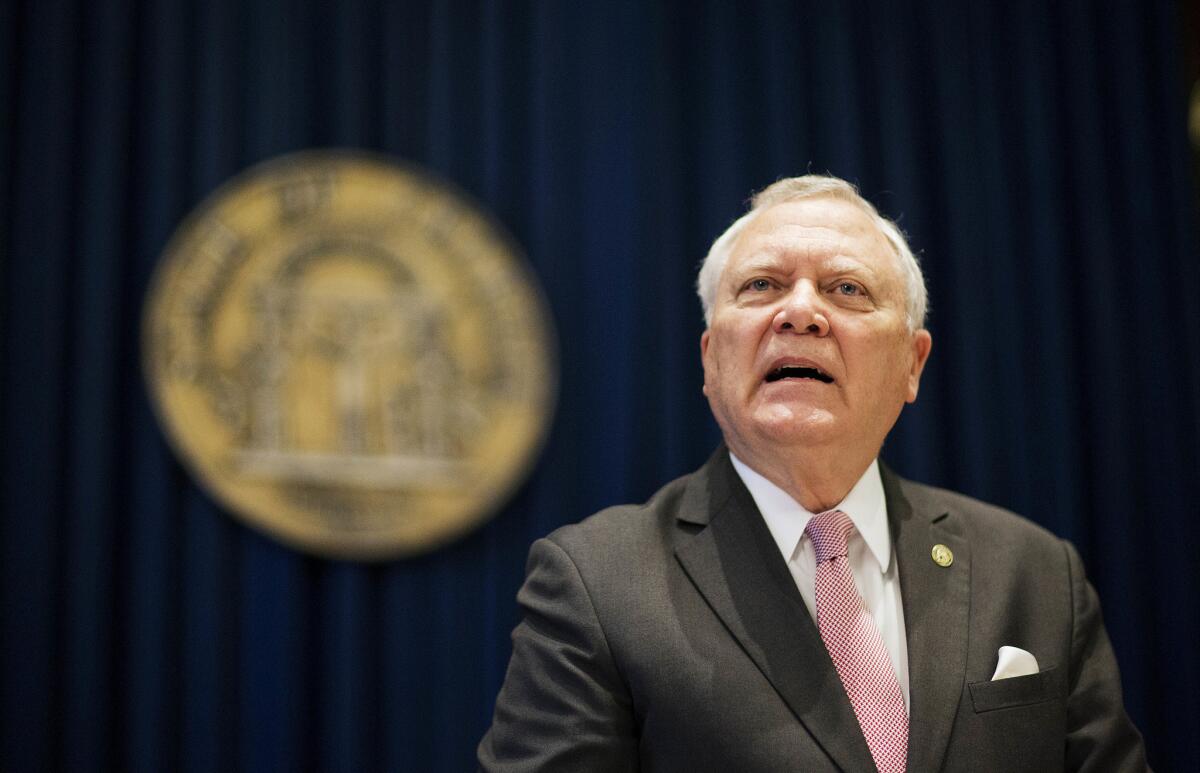Hollywood reacts to Georgia governor’s veto of anti-gay bill

Georgia Gov. Nathan Deal speaks during a press conference to announce he has vetoed legislation that would have allowed clergy to refuse to perform gay marriages.
Walt Disney Co. and other organizations praised Georgia Gov. Nathan Deal’s decision Monday to veto controversial legislation that looked to expand individuals’ and business’ rights to deny services to those whose way of life conflicts with their religious beliefs.
The stakes were high for Georgia. Since lawmakers March 16 approved the bill perceived as anti-gay, many influential companies had come out against the legislation. Last week, Disney, the world’s largest entertainment firm, said it would stop making films in the state if Deal, a two-term Republican governor, signed the Free Exercise Protection Act into law.
Disney was the first major studio to threaten to take its business elsewhere, sparking an extraordinary campaign by Hollywood companies to derail the legislation.
“We applaud Governor Deal for making the right decision on this piece of legislation and look forward to continuing our film production in Georgia,” a spokesman for Disney said in a statement.
Disney, which did not make executives available for interviews Monday, has shot several films in Georgia in recent years, including 2015’s Marvel Studios-produced “Ant-Man.” The company’s “Guardians of the Galaxy 2” also is in production there.
Like many other studios, the Burbank company had been lured to Georgia in part by lucrative production incentives the state offers to film and TV companies.
The issue struck a chord with Chairman and Chief Executive Robert Iger, who felt it was important for the company to make a strong statement on the legislation given Disney’s presence in the state, said a person close to the studio unauthorized to comment publicly.
After Disney’s boycott threat, other show business firms — including Netflix and Weinstein Co. — had also said they would stop making films and TV shows in the Peach State. Media giants including Time Warner and Viacom also decried the bill.
Ric Reitz, president of SAG-AFTRA in Atlanta, said Georgia’s film business community was experiencing a “sense of relief” over news of Deal’s veto.
“I think the governor showed a lot of courage and conviction today with his announcement,” he said. “Don’t discount the fact that Georgia is always trying to find the right solution. It may not always be easy and it certainly isn’t unanimous.”
When reached for comment Monday, a handful of other major entertainment companies, including Warner Bros., 20th Century Fox and Universal Pictures, referred The Times to the Motion Picture Assn. of America, a trade organization that represents the studios.
In a statement, Vans Stevenson, the MPAA’s senior vice president for state government affairs, lauded Deal’s veto of the measure, saying it “would have legitimized discrimination based on sexual orientation.”
It wasn’t just Hollywood companies that were critical of the Free Exercise Protection Act. Apple, Turner, Unilever, Hilton and Yelp also opposed the legislation, along with Atlanta’s three professional sports teams.
The Free Exercise Protection Act would have protected faith-based entities from providing services, such as performing gay marriages, contrary to their beliefs. Supporters of the bill said it would’ve safeguarded religious freedoms and protected institutions from hiring people whose practices or beliefs they oppose.
Efforts by Georgia to transform itself into the “Hollywood of the South” have paid dividends in recent years. In Georgia’s last fiscal year ended June 30, 248 films went into production there, generating spending of more than $1.7 billion — up from $132.5 million in 2007. Currently, the movies “Fast and Furious 8” and “Baywatch” are shooting in the state.
Julie Plec, the creator of the CW’s “Vampire Diaries” and “‘The Originals” — both of which shoot in Atlanta — said that the comments Deal made at a news conference Monday resonated with her. Announcing his veto, Deal told reporters that the legislation did not reflect Georgia’s character as a “welcoming state.”
“I feel like what [Deal] said was that he made a decision based on his own sense of self and human decency and I completely support that message and I’m glad he didn’t take too long to get it out there,” said Plec, who splits her time between Atlanta and L.A.
The Human Rights Campaign, an LGBT civil rights advocacy group, said Monday that Deal “set an example for other elected officials to follow” by vetoing the measure.
Hollywood heavyweights such as Anne Hathaway, Rob Reiner and Harvey Weinstein signed a letter by the group last week demanding that the governor veto the bill.
“Our message to Governor Nathan Deal was loud and clear: this deplorable legislation was bad for his constituents, bad for business, and bad for Georgia’s future,” said Human Rights Campaign President Chad Griffin in the statement released Monday.
Film producer Bill Mechanic, the former chief executive of Fox Filmed Entertainment, said Hollywood appeared to play a pivotal role in swaying a legislative battle.
“There is a lot of production in Georgia and discrimination reaches into the Hollywood community very deeply,” he said.
Georgia, far from the only front where the battle between “religious freedom” and gay rights is being waged, is the latest state to reach a resolution on the matter.
South Dakota’s legislature attempted to pass a bill in February that regulated bathroom use by “chromosomes and anatomy,” thereby blocking transgender individuals from using facilities that suit their identities, only to have the measure struck down by Gov. Dennis Daugaard after a significant national outcry.
On Monday, a spokeswoman for Louisiana Gov. John Bel Edwards said that he planned to rescind a 2015 executive order from former Gov. Bobby Jindal that allowed businesses and government agencies to refuse services to gay people. Shauna Sanford, the governor’s press secretary, said Edwards would rescind the “religious liberty” order in the “near future.” Like Georgia, Louisiana is a major hub for film and TV production.
In North Carolina, Gov. Pat McCrory signed a contentious bill into law last week that prevented cities and towns from passing local anti-discrimination ordinances, largely in reaction to a measure passed in Charlotte in February that looked to provide protection for transgender individuals’ restroom choice.
LGBT-rights groups filed a federal lawsuit challenging the new North Carolina law, calling it discriminatory and said it singles out LGBT people for “disfavored treatment.”
daniel.miller@latimes.com
libby.hill@latimes.com
Times staff writer Yvonne Villarreal contributed to this report.
More to Read
From the Oscars to the Emmys.
Get the Envelope newsletter for exclusive awards season coverage, behind-the-scenes stories from the Envelope podcast and columnist Glenn Whipp’s must-read analysis.
You may occasionally receive promotional content from the Los Angeles Times.








